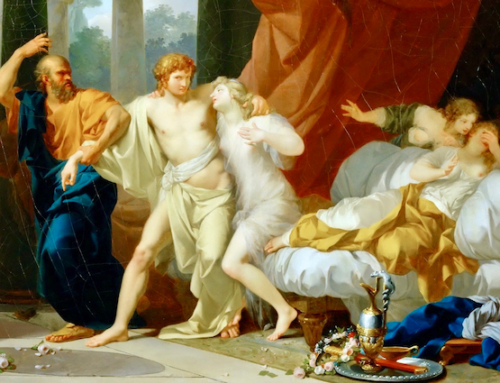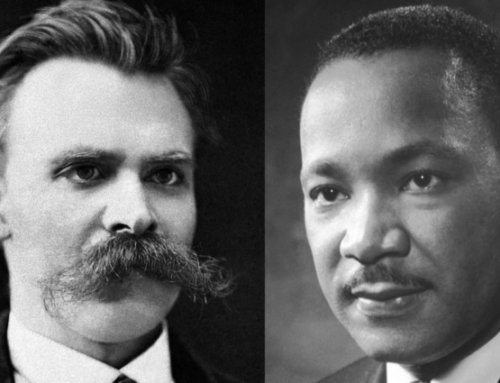Thales was the first Greek to ask himself what are the origin and principle from which all things come. By looking for these, he destroyed the very foundation of the ancient belief in an intrinsically chaotic universe. And for that, he deserves to be remembered, especially by us, the inhabitants of the post-philosophical world.
 Why should we care about Thales, a man who became the butt of the jokes of many a thinker because he was so intent on gazing upon the heavens that he fell down a well, a man who claimed that “the earth floats on water,” that water is the ἀρχή (arché), the origin and principle from which all things come, that lodestones have souls because they move things? His name might be a useful one for crossword puzzle lovers to know, but it is doubtful that crossword puzzle designers would use it. As for his thought, it sounds infantile to our ears, foolish, like a child’s first stick-figure portrait of his family: cute but eminently forgettable. Who, today, can take the claim “the earth floats on water” seriously? Why, then, should we care about Thales?
Why should we care about Thales, a man who became the butt of the jokes of many a thinker because he was so intent on gazing upon the heavens that he fell down a well, a man who claimed that “the earth floats on water,” that water is the ἀρχή (arché), the origin and principle from which all things come, that lodestones have souls because they move things? His name might be a useful one for crossword puzzle lovers to know, but it is doubtful that crossword puzzle designers would use it. As for his thought, it sounds infantile to our ears, foolish, like a child’s first stick-figure portrait of his family: cute but eminently forgettable. Who, today, can take the claim “the earth floats on water” seriously? Why, then, should we care about Thales?
The question would look coy, and even pretentious, were it not for the fact that Aristotle took the time to record Thales’s thought (or at least some of it), and to report that Thales was the first philosopher because he was the first to claim that there was an ἀρχή, an origin and principle, of what is—τό ὄν—of reality itself. If that massive man, whom Aquinas called the Philosopher, took the time (centuries after the fact) to think through what Thales was reported to have said and to write about it—to hang the Milesian’s stick-figure portrait of reality on philosophy’s wall of fame, so to speak—there have to be reasons, very good reasons to remember Thales.
Thales might have been the first person in recorded history to have fallen down a well because he was gazing up the heavens, but he was certainly not the first person to look up at the sky in wonder. The Egyptians had been pondering the heavens millennia before Thales was born, and those who placed the stones of Carahunge in Armenia carefully recording the positions of the stars long before that, it seems. Even the youngish Stonehenge was old by the time Thales started to talk about water. So what makes Thales important enough for Aristotle to have spent the time he did thinking about what he said and why?
There is a difference between what the Ancient Egyptians did when they looked at the skies and what Thales did. Neolithic men gazed upon the heavens in fear and trembling: Carahunge, Nabta Playa, Stonehenge, and the Goseck Circle were religious sites—two of them, apparently, still contain traces of ritual sacrifices. Many are the names of the immortal being whom the ancients took the sky to be: Ouranos was the Greek name; Caelus, the Roman one; Nut, the Egyptian one. Many are the names of the immortal being whom they believed was older than the sky: the primordial void that anteceded and generated the Cosmos. Chaos was the Greek name; Nun, the Egyptian one. These were but two of many denizens of the primeval universe. In the ancient imagination, the heavens pullulated with divine entities: a collection of awe-ful, capricious, powerful immortals, whose whims and pronouncements constituted the warp and weft of all mortal life.
What Étienne Gilson says in God and Philosophy about the religious-minded Greek holds for every religious-minded ancient. He “felt” not just that all the world was controlled by the gods, or indeed was a god—the winds, the mountains, the oceans, the brooks, the rivers, the earth, the air, and so forth. He felt that his every action was entangled with the gods. There was no place where he could step, where he did not step on a god. The earth itself, for the ancients, was a god (or goddess)—Geb for the Egyptians, Gaia for the Greeks, Tellus or Terra for the Romans. There was no water, the ancient felt, in which he could swim, where he was not surrounded by a god. The sea itself was a god—Pontus—or goddess—Thalassa. The Nile, on the other hand, was a goddess, Anuket. There was no time when the ancient did not feel that he was under the gods’ control. In the dark, the Greek cowered beneath the consorts Erebus (the god who was darkness itself) and Nyx (the goddess who was the night), who literally penetrated his world. During the day, he bowed before their daughter Hemera (the goddess who was the day) who watched every move he made. There was no part of himself that ancient man felt was outside of the gods’ sway. While Erebus and Nyx reigned over the Greek, their offspring—Hypnos (sleep), the Oneiroi (dreams)—filled the air and caught men. While Hemera ruled, her siblings Eris (strife), Oizys (despondence)—Miseria for the Romans—Eros (desire)—entered men’s minds. Thanatos (death), another one of their siblings and spawn of Erebus and Nyx, wandered when he wanted, where he wanted, snatching whom he wanted. There were, of course, also nice gods and goddesses afloat and on the hunt while Eris, Oizys, and Eros did their mischief: Clio, Calliope, Thalia, to name a few of the muses, for instance. But whether good or bad, it was the gods, ancient man felt, who determined—or more precisely were—his moods. As a result, as Gilson puts it, he “felt himself the passive battlefield of overpowering and too often mutually conflicting divine influences” (12). His mind, and indeed his very life, were not really his own. The latter was spun, measured, and cut by goddesses: the Moirai (Fates).
Relics of these ancient beliefs still live on our calendars today. Wednesday—Wotan’s (Odin’s) day—anyone? Satur(n)day? March, mensis Martius: the month of Mars. Relics live on throughout our language. ‘Flu’, shorthand for influenza, is nothing but the corruption of the Latin influentia, which astrologers used to characterize those illnesses that were caused by the influence of the stars. ‘Mania’ was an ancient Greek (and Etruscan/Roman) goddess, who filled men’s minds and spoke through their mouths. ‘Desire,’ and its Latin ancestor desidera, literally means of or from (de) the stars (sidera). ‘Fascinate’ means to be under the influence of that ancient Roman god fascinus, a fact that would make any proper Victorian blush and feminist enraged.
The allure of these ancient beliefs—and of the consequent passivity and helplessness of man before his very life—has never really left us. And, as the proliferation of neo-pagans, pantheists, crystal worshipers, and wiccans should indicate, ours is a perfect breeding ground for an overwhelming resurgence of the ancient yoke. This should not be surprising. That cathedral of ‘knowledge,’ whose foundations were dug by a group of men who rebelled against nature and thought that they could control the universe if only they could measure it (and by that frightened man who could not distinguish his dreams from his sensations), is ugly and just plain uninviting. Who does not prefer immersing himself in Hesiod’s Theogony, accounts of the Egyptian Ogdoads, or Celtic myths to entering those arid portraits of reality deduced by Stephen Hawking, Richard Dawkins, or Daniel Dennett? Who does not prefer living in a numinous universe, to living in the cold, dark, empty, random place in which physical scientists, cognitive scientists, the heirs of the logical atomists, the left-over existentialists, the scientific materialists, not to mention the Nova channel, claim that we exist?
The modernist cathedral is also castrating. Like the modernist cosmos, it is cold, dark, and has no place for the whole of any one of us, who have our dreams, aspirations, and deep questions. It has no place for the singularity of any one of us, for our own particular thoughts and thought patterns, for our own peculiar talents insofar as they are unique and belong to us personally. It cannot. It was built on univocity, and univocity is the enemy of diversity and uniqueness. To enter the cathedral is to shed our individuality and to conform.
The cathedral is above all sprawling and discontinuous. It is a maze of ever-growing wings that branch into an ever-expanding plethora of distinct sealed quarters: the empirical science wing into the separate quarters of biology, physics, chemistry, bio-physics, quantum chemistry, and so on; the applied science wing into the separate quarters of pharmacology, medicine, virology, oncology, ophthalmology, and so on; the mathematics wing into the separate pure quarters of set theory, number theory, topology, algebra, geometry, and so forth, and into the separate applied quarters; and then there are the language wing, the literature wing, the history wing, each with its intricate branchings into quarters and quarters. Each of the sealed quarters of each wing of that sprawling cathedral that is the fruit of modern thought proposes its own answers to its own questions (that are ever more removed from the concrete world). Each sealed quarter has its own distinct language that no one outside of that quarter understands. Each quarter analyzes a smaller and smaller portion of reality. Each ignores more and more of the whole of reality.
And then there is that chaos of thought unfettered from reality that has been spewing from the forgotten heart of the cathedral, philosophy, for a long, long time. Take, for instance, the cacophony of thoughts on ‘evil’ of the neo-Humean J.L. Mackie. Mackie insists that there are no objective values: that values, to use that contemporary phrase, are ‘social constructs.’ He begins his Ethics: Inventing Right and Wrong with the straightforward claim: “There are no objective values.” In his widely read “Evil and Omnipotence,” on the other hand, Mackie claims that it is inherently contradictory to believe that a good omnipotent God exists when the earth is filled with evil. Just how he believes it possible to make both of these claims is not clear. If values are not objectively categorizable realities, then ‘evil’ cannot be an objectively categorizable reality. And if evil is not an objectively categorizable reality—if it is not objectively real—then it surely cannot fill the earth or make the existence of anything—let alone that of a good omnipotent God—impossible, any more than can unicorns or sphinxes. If evil is not objectively real, there is no there there. What is not there (or anywhere) can be no obstacle of any sort to clear thinking, let alone be one of the terms of a real contradiction. Mackie himself admits this (or at least almost does) in “Evil and Omnipotence” when he claims that if evil is a privation, then there is no problem of evil. And yet, the Mackie position on the ‘problem of evil’ has been discussed with all seriousness in academic circles. It has many variants. One belongs to that proponent of infanticide, Michael Tooley. Others have trickled into the public arena, where they have become a stumbling block for many.
This is not all that has trickled into the public arena from that labyrinth that is the cathedral of modern thought. Our entire political world seems to be dominated by thought that is unfettered from reality. There are thousands upon thousands of would-be immigrants at our southern borders. They travelled there because they want to partake in the American Dream. They have come because the American Constitution, the American way of life, the American love of the law, the American compact objectively burgeoned into a powerful reality. It is the objective reality of America that draws them: the compact that has given each and every American the chance to flourish, the promise of order, peace, and a future. There are politicians who insist upon letting the immigrants cross the border with no questions asked. These politicians often also claim that America (and its Dream) are guilty of every loathsome ism conceivable. Have these politicians asked themselves if their insistence upon letting anyone into the country, no questions asked, violates the very foundations of what made the immigrants want to enter the country: the American compact, the order, the law that guarantees the safety of every individual and thereby undergirds the promise of peace, prosperity, and the pursuit of happiness? Have they, who insist on defending immigrants, not considered that if America is the loathsome place that they claim it is, it might be more coherent for them to tell the immigrants that it is in their best interest to stay away from America?
Living in a chaos of thought (and feeling) unfettered from reality is living in a world that makes for the resurgence of the ancient yoke of human passivity and helplessness. Today’s youth (and not just they), like the ancient Greek, the Sumerian, the Assyrian, the ancient Egyptian, the Olmec, the Mayan, the Chimú, and the countless other ancients and pre-Columbians, cannot but be tempted to believe that they cannot understand the universe: that it is impossible to understand the universe, the world in which they live. How can one understand a universe if one believes that subjective thoughts (insofar as they are subjective thoughts) can preclude the possibility of the objective existence of realities, if one believes that evil is not an objective reality but can still make the existence of God impossible, if one believes that upholding the law means ignoring it, that genetics both determine one’s identity (as it is claimed they do for our races) and do not determine one’s identity (as it is claimed that they do not do for our genders), that history never happened but still happened, if one is surrounded by a babel of languages spoken by scientists, each of whom examines his little niche of the universe and none of whom can see the connection between the niches? The universe as seen through such a lens cannot but be taken to be inherently unintelligible and intrinsically chaotic. And what is seen as intrinsically chaotic cannot by definition be understood, fathomed, gauged, and waded through.
Such was the universe for the ancient and the pre-Columbian. How could an ancient Greek understand a universe in which, he believed, Eris (conflict) was a primordial power that not only entered into men’s minds at a whim, but also stirred the gods, the Titans, a universe that he held was bred by Chaos (the god) and in which Chaos was never unseated? How could he fathom the universe when his cosmology claimed that Ouranos co-exists with Kronos, the son who castrated him, that Kronos continues to preside over the harvest on the surface of the earth, even though his own son, Zeus, had imprisoned him in Tartarus, the deep abyss in the underworld? The simple answer is that he could not. The universe as it was seen by the ancients (and increasingly by us) was inherently unintelligible: intrinsically chaotic.
Chaos makes men helpless. Minds are useless in chaos, and it is man’s mind that can help him guide, fathom, gauge, and live his life. It is no wonder, then, that as Gilson claims, ancient man “felt himself the passive battlefield of overpowering and too often mutually conflicting divine influences.” Ancient man could not order his own thoughts for the very simple reason that he believed that there was no order inherent in the universe, and that such an order could not be. The chaos in which he felt he lived was, he believed, caused by the very causes of the universe. Chaos, he felt, was woven into the universe. The universe itself, he was convinced, deprived him of the very possibility of ordering his mind. It made him “passive,” helpless.
“Battlefield” is also important here. The very belief that the universe is inherently chaotic cannot but turn man into the natural enemy of reality. Man cannot function as man in chaos. He cannot think in chaos. He cannot communicate in chaos. He cannot will in chaos. He cannot love in chaos. He cannot live with other men in chaos. He can perform none of his exquisitely human functions in chaos. He cannot survive in chaos. Man, with his natural need to know, to will, to love, to communicate, to live with other men—man with his need for order—is the enemy of chaos. A cosmology that depicts the universe as intrinsically chaotic cannot but thus view man both as the victim of the universe and as a threat to the universe: something that the universe itself must conquer and destroy, because it is threatened by him. Order is the enemy of chaos, and man needs order. A cosmology that depicts the universe as inherently chaotic cannot but view the history of the universe as an existential battle between man and the universe, a battle in which the universe struggles to overwhelm man’s need for order, and in which man struggles to stand, knowing that if he does chaos subsides. In a universe taken to be intrinsically chaotic, it is man who is the battlefield.
And those cosmologies that claim implicitly or explicitly that there is no intelligibility inherent in the universe, no order, cannot but call upon raw pointless power to classify and wade through reality. Order, an order intrinsic to reality, can be denied, but change not, and the causes of change. Birth, death, growth, decay, the seasons, the weather are facts. It is against their backdrop that we measure our lives. In a chaotic universe, the causes of change can be one, or many, but whatever the cause (or causes), it (or they) is random, unknowable, blind: it (or they) is just power. Disorderly causes of change—causes that lack intelligible purposes—are nothing but raw pointless power. Plato pointed this out in the Republic, and Aristotle in the Nicomachean Ethics. Nietzsche immortalized the phrase “will to power” after generations of thinkers who preceded him repeated the Cartesian nonsense that men could not know the world around them.
Just as those who believe that they live in chaos cannot but believe that reality cannot be understood, just as those who believe that they live in chaos cannot but recognize that it is man himself who is the enemy of reality, so those who believe that the universe is a locus of conflicting powers cannot but make power itself—blind power—the point of reality and of their own existences: on acquiring it if they can and on appeasing it if they must. It is precisely because the ancients believed themselves to be “passive battlefields” in a chaotic universe that the remains of ritual sacrifices have been found around ancient religious sites. It is precisely because they believed themselves to be “passive battlefields” in a chaotic universe that the Carthaginians sacrificed their children, and pre-Columbian religions were so very thirsty for human blood. People who see themselves as victims because they are the natural enemies of the powers that generate the chaotic universe defend themselves by appeasing those powers—the ‘gods’—with the blood of the gods’ own natural enemies: their own kind. They defend themselves by becoming like unto those powers that they try to appease: by blindly using power to destroy the order that they themselves represent.
And then there was Thales, the man who became the butt of the jokes of many a thinker because he was so intent on gazing upon the heavens that he fell down a well, a man who claimed that “the earth floats on water,” that water is the ἀρχή (arché), the origin and principle from which all things come. There can be no exaggerating the importance of the simple claim that that water is the ἀρχή, the origin and principle from which all things come. Principles are the antithesis of chaos. Principles are the causes of order. They are inherent in the reality of which they are principles. If there are principles, then the universe cannot be chaotic. If there are principles, it is not chaos that reigns.
By looking for an ἀρχή—principle—Thales began the Greek—and Western—response to millennia of oral and written cosmogonies that led human beings to feel like “passive battlefields” who need to perform sacrifices on their own kind in order to ensure their own survival. If there is an ἀρχή, then the universe cannot be inherently unintelligible. If there is an ἀρχή, then man can order his thoughts and mind: he can understand. If there is an ἀρχή, then man can walk upright, name things, and even predict that there will be a bumper crop of olives, stunning all those who do not know that there is an ἀρχή, which is precisely what Thales did and made a fortune. If there is an ἀρχή, then man is not a “passive battlefield,” a victim of unknowable powers. If there is an ἀρχή, then power, raw power, is not the answer.
Of course, Aristotle gave a place of honor to Thales’s stick-figure portrait of reality. Thales was the first Greek to ask himself not who pushed me down the well, or whom have I offended (and have to appease) since I now find myself at the bottom of the well, but what is the water in the well? Who cares if he got the ἀρχή wrong. By looking for one, he destroyed the very foundation of the ancient cosmogonies, the root of slavery of the ancients. And for that, he deserves to be remembered, and re-remembered, especially by us, the inhabitants of the post-philosophical world, the world of the sprawling, babelic cathedral of modernity, that looks so much like the pre-philosophical world. Thank God for Thales!
The Imaginative Conservative applies the principle of appreciation to the discussion of culture and politics—we approach dialogue with magnanimity rather than with mere civility. Will you help us remain a refreshing oasis in the increasingly contentious arena of modern discourse? Please consider donating now.
The featured image is courtesy of Pixabay.







“…the post-philosophical world, the world of the sprawling, babelic cathedral of modernity…….” Beautifully said, well done.
Excellent piece! In fact, the word Thales employs – so often translated as ‘water’ – is better understood as ‘dampness’ or ‘moisture’. Given our dependency upon ( indeed, large composition of! ) water, Thales wasn’t far off the mark! I would, however, be hesitant in according him the title of ‘first philosopher’ – the reason being he supplied no argument/s for his speculations; for me, that title is best bestowed upon Parmenides.